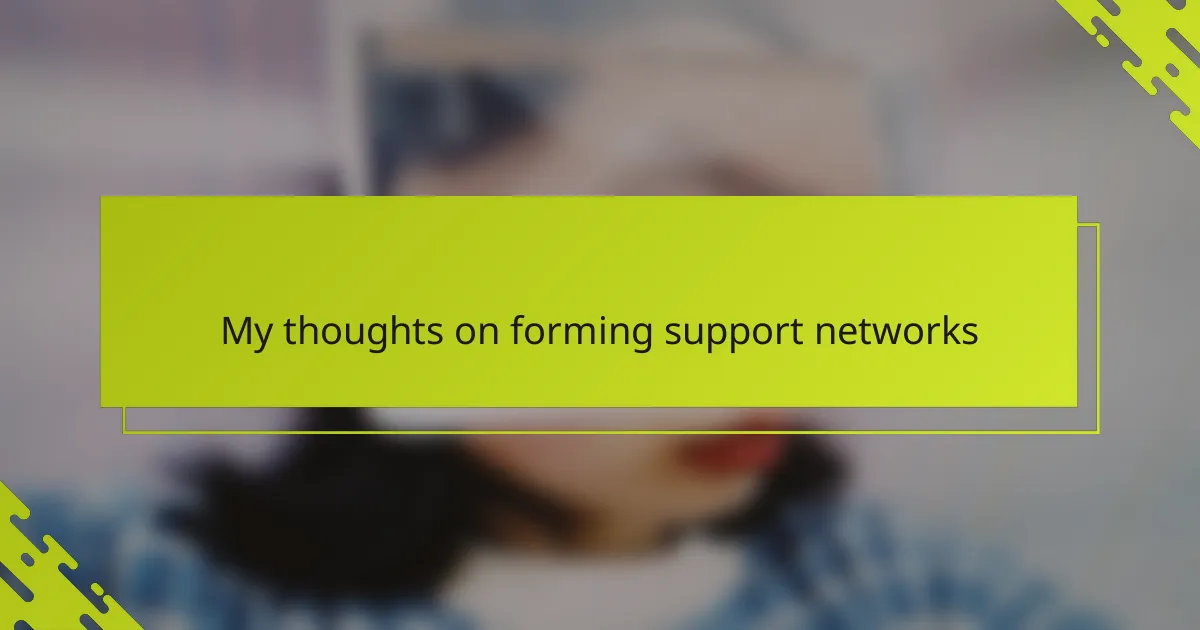Key takeaways
- Support networks foster belonging and resilience, requiring effort and vulnerability to build.
- Trust, reciprocity, and consistency are essential elements of effective support networks.
- Forming and sustaining connections involves intentionality, inclusivity, and openness to change.
- Personal experiences in support groups highlight the importance of being seen and understood in overcoming isolation.
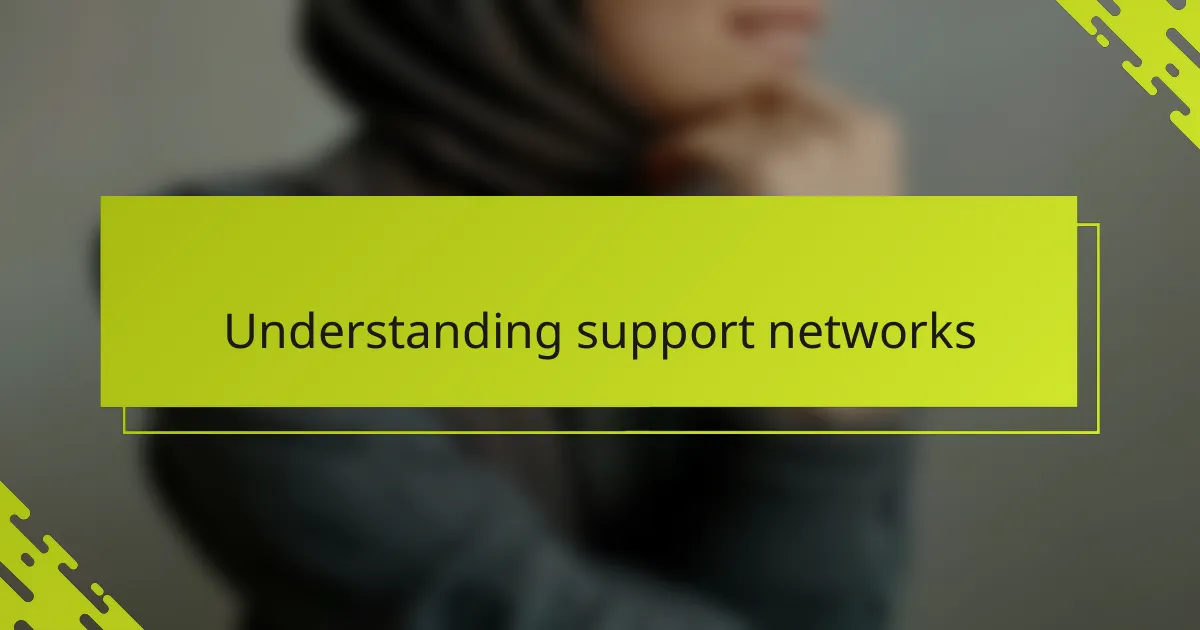
Understanding support networks
Support networks are more than just a group of people; they’re the spaces where we find belonging, understanding, and safety. I’ve learned that these connections often form naturally when you share your true self, but they also require intentional effort and vulnerability. Have you ever noticed how a simple conversation with someone who truly gets you can lift the heaviest weight off your shoulders?
For me, understanding what a support network means goes beyond just emotional comfort—it’s about building resilience through shared experiences. When I’ve faced moments of doubt or isolation, having those trusted voices remind me I’m not alone has been invaluable. It makes me wonder: how different would our journeys be if we actively sought and nurtured these bonds from the start?
Sometimes, I think the real challenge lies in recognizing who belongs in these networks and who doesn’t. Not everyone in your life will understand or support your identity, and that’s okay—it helps you prioritize the relationships that truly matter. What if we viewed support networks as evolving communities rather than fixed groups, allowing space for growth, healing, and authenticity?
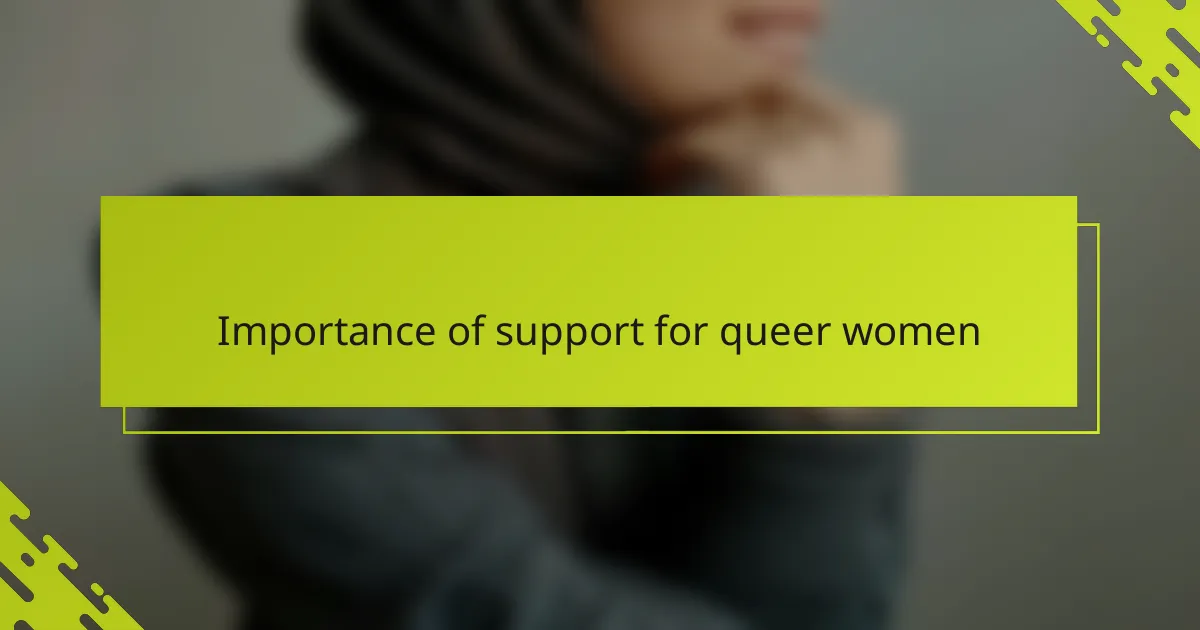
Importance of support for queer women
Support for queer women isn’t just beneficial—it can be lifesaving. I remember times when sharing my truth felt risky, but the strength I gained from those who stood by me was undeniable. Have you ever felt that relief when someone just listens without judgment? That kind of support changes everything.
What strikes me is how support can act as a shield against the loneliness and misunderstanding queer women often face. When a community surrounds you with acceptance, it fuels courage and self-love in ways that are hard to describe. Isn’t it incredible how simply knowing you have people who see and celebrate your whole self can lift your spirits?
At its core, support nurtures our sense of belonging in a world that can sometimes feel isolating. For me, recognizing the importance of these networks meant acknowledging my worth and creating a space where I could be wholly me. How might your life transform if you allowed yourself to lean into that kind of support more deeply?
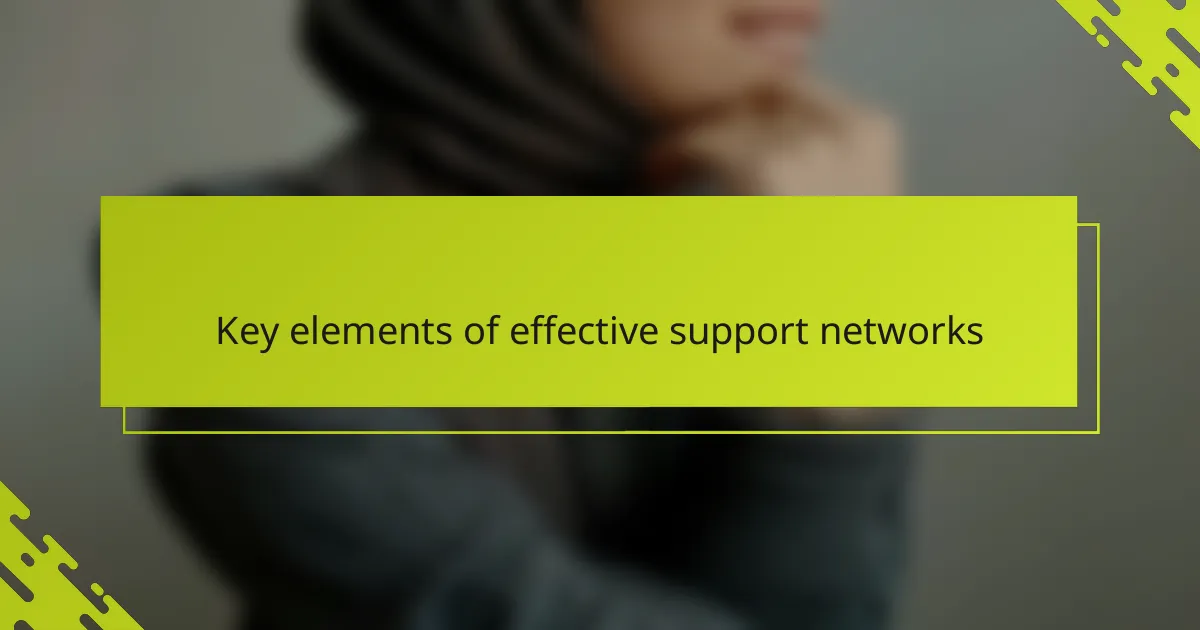
Key elements of effective support networks
Trust is the foundation of any effective support network. From my experience, it’s the feeling that you can share your fears and joys without hesitation that makes these connections truly meaningful. Have you ever noticed how trust turns casual chats into lifelines during tough times?
Another key element is reciprocity—support should flow both ways. I’ve found that when I’m open to giving as much as I receive, the bond deepens and becomes more resilient. Isn’t it empowering to be part of a circle where everyone lifts each other up equally?
Consistency also plays a crucial role. When people show up regularly, even in small ways, it builds a reliable sense of safety. I often reflect on those who check in unexpectedly; their presence reminds me I’m not navigating this alone. What small acts of consistency have you experienced that made all the difference?
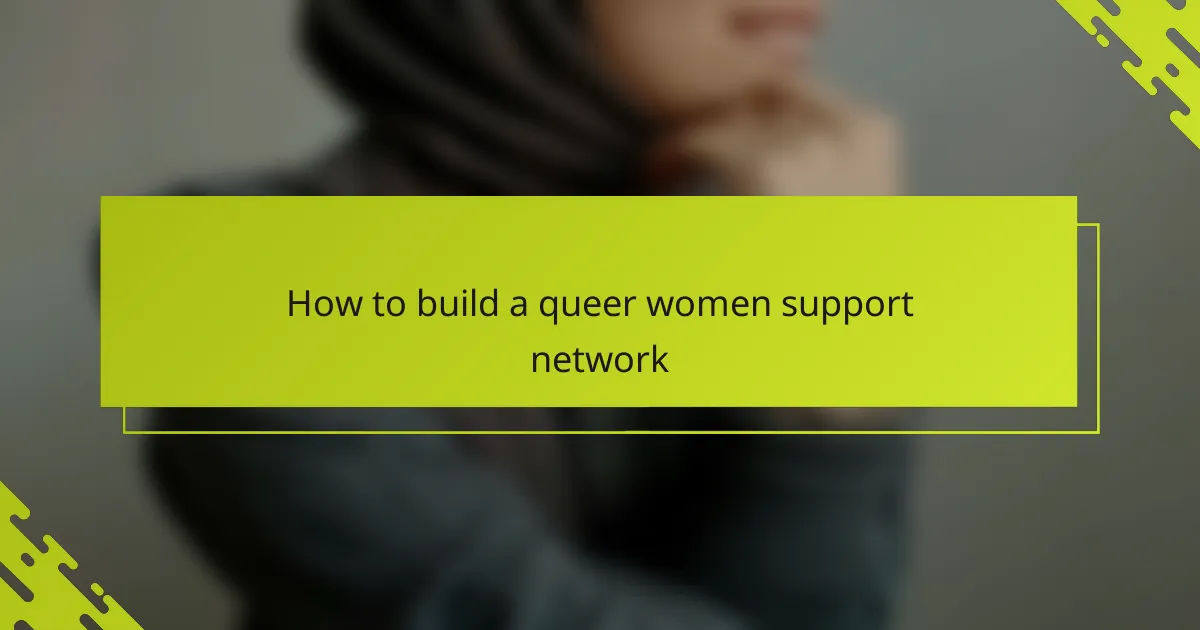
How to build a queer women support network
Building a queer women support network starts with finding spaces where authenticity is not just welcomed but celebrated. I remember joining a local meetup group nervously, unsure if I’d fit in, only to discover that shared stories and laughter created bonds faster than I expected. Have you ever felt that instant connection with someone who simply sees you?
From there, it’s about nurturing those connections through genuine care and regular contact. I’ve learned that sending a quick message or showing up for a virtual coffee can turn acquaintances into trusted allies over time. What small gestures have you found help deepen your relationships?
Lastly, being intentional about inclusivity matters. I try to welcome diverse voices and experiences within my network because it enriches our collective understanding and support. How might your network grow if you embraced its evolving nature with openness and curiosity?
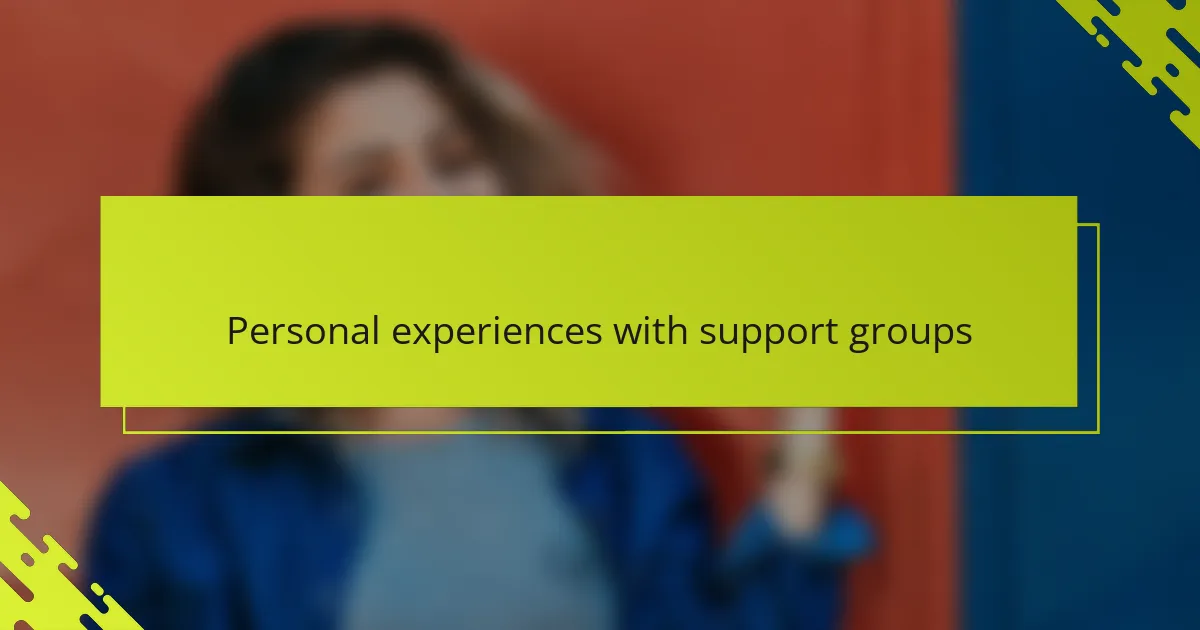
Personal experiences with support groups
I recall the first time I joined a queer women’s support group feeling hesitant, unsure if my story would resonate. But as I listened and shared, I realized how powerful it was to be seen without explanation—a feeling that softened my fears and opened my heart. Have you ever walked into a room full of strangers and left feeling like you’d found your people?
There was a period when I struggled silently, convinced that no one could understand the complexities of my identity. Finding a support group changed that narrative entirely; hearing others voice experiences close to my own made me feel less isolated. It makes me wonder how much healing could happen if more of us reached out and said, “I’m here, and I want to listen.”
Sometimes, I’ve found that the most lasting support comes from unexpected places—a casual conversation that turns into regular check-ins, or a friend who remembers small but significant details of my journey. These moments, though simple, have meant everything because they say, “You matter.” What small act of support has stayed with you long after it happened?
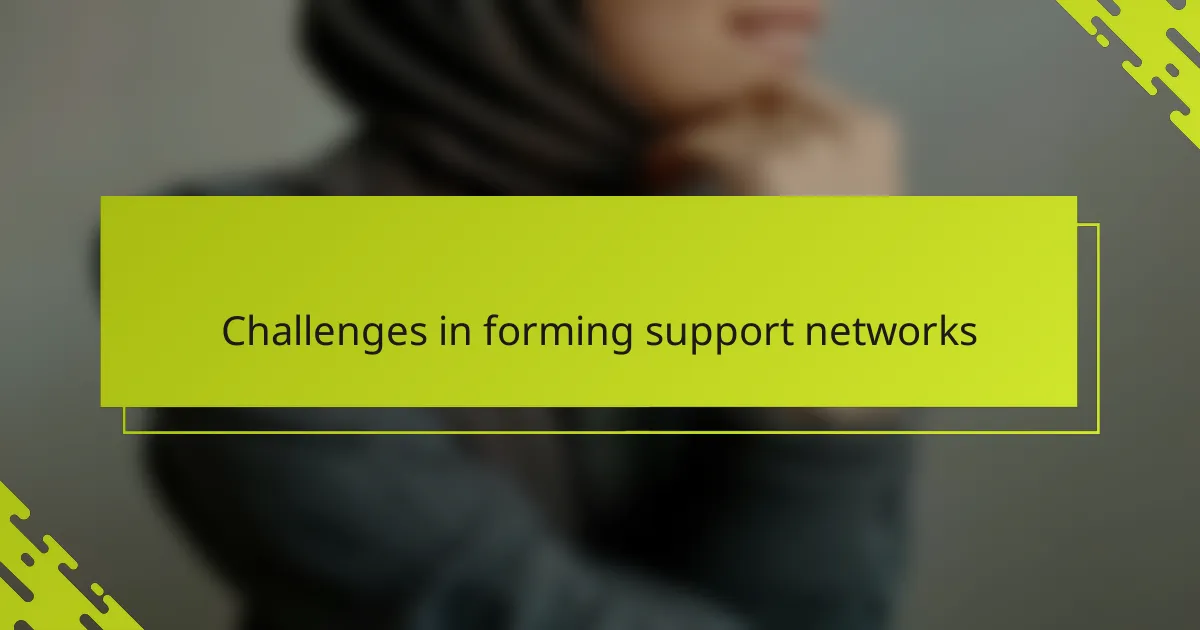
Challenges in forming support networks
Forming support networks isn’t always straightforward. I’ve often felt hesitation, worried that my experiences might not be understood or accepted, which sometimes made opening up feel risky. Have you ever wondered why it’s so hard to let your guard down, even when you crave connection?
Another barrier I’ve noticed is finding spaces where queerness is not just tolerated but truly embraced. It can be exhausting trying to sift through groups that don’t fully get the nuances of queer women’s experiences. How many times have you left a gathering feeling more alone than before you arrived?
Trust, too, takes time to build, and that waiting period can be painful. When I’ve rushed into relationships hoping for immediate support, I’ve sometimes been met with silence or misunderstanding. What do you think makes someone trustworthy enough to hold your vulnerabilities?
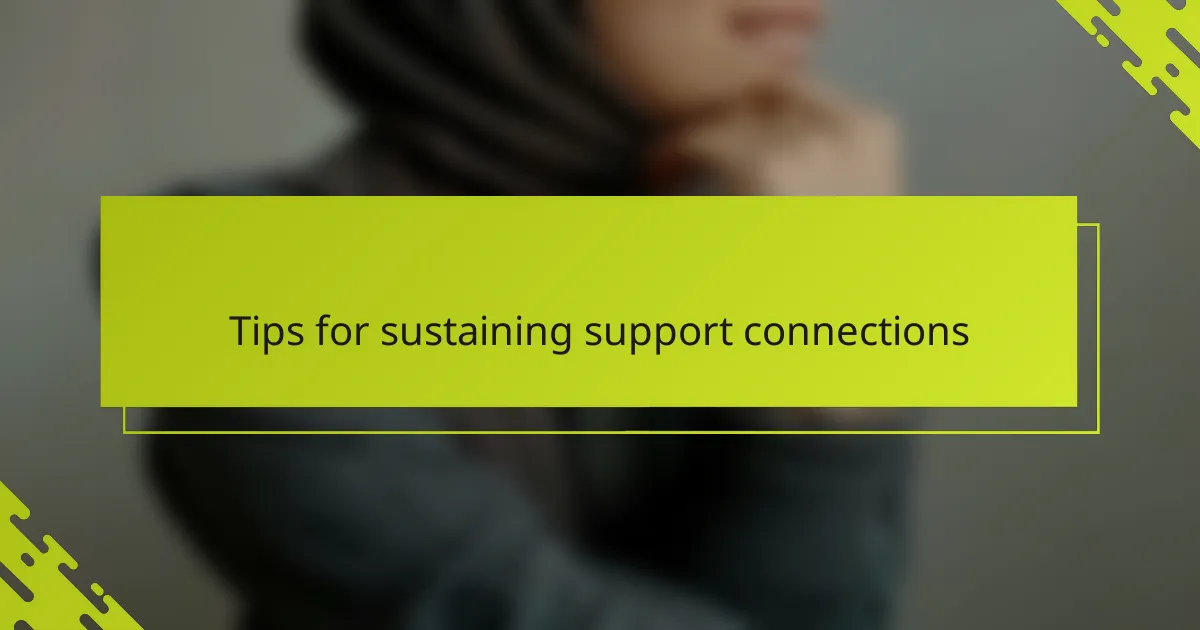
Tips for sustaining support connections
Keeping support connections alive takes more than just check-ins; it requires intentionality. From my experience, setting small, regular reminders to reach out—whether through a quick text or sharing a song that made me think of someone—has kept the threads of these relationships from unraveling. Have you noticed how those tiny acts often speak louder than grand gestures?
I’ve also learned that honesty about my own needs is crucial. When I openly express when I need space or extra support, it creates room for mutual understanding instead of resentment. Isn’t it refreshing when someone respects your boundaries while still showing up when it counts?
Lastly, I find that embracing change within these networks helps them endure. People grow, life shifts, and sometimes the dynamics morph in unexpected ways. Rather than resisting, I try to stay curious—how can this connection evolve to keep supporting us both? This mindset has transformed many relationships from fleeting to foundational.
